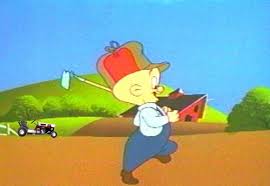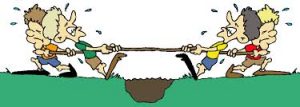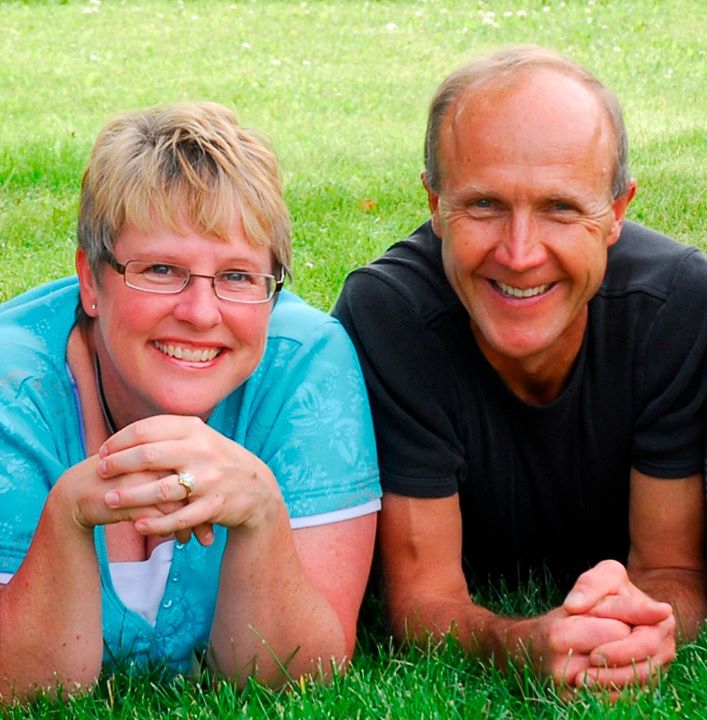Do you remember the Bugs Bunny cartoons? If so, what pops into your mind with the name, Elmer Fudd?
The picture in my mind? I see a short, pudgy character with his hunting cap perched on his head, gun over his  shoulder, marching through the woods like a soldier, and with a slow deep voice saying, “Where is that wascally wabbit.” The wabbit, of course, is Bugs Bunny.
shoulder, marching through the woods like a soldier, and with a slow deep voice saying, “Where is that wascally wabbit.” The wabbit, of course, is Bugs Bunny.
Bugs is a happy-go-lucky, fun-loving trickster, who takes great pleasure in teasing and taunting and playing mind-games with Elmer. When Elmer is on the hunt, Bugs always has a nearby rabbit hole in which to disappear. And even in the times when Elmer has Bugs in his grasp, something happens which allows that wascal to slip away. Elmer says, “I’ll get you, you wascally wabbit.”
That wascally wabbit is a lot like the elusive, intangible feeling of happiness, isn’t he? Most people tend to be on the hunt for happiness, or “more” happiness, but it just keeps slipping through their fingers.
“I was feeling pretty happy, but then she …”
“I try and try and try to be happy, but it’s hard work.”
“Everything was going great, but then that SOB said …”
“How can I be happy when he keeps …?”
Happiness, hmmm? My coaching clients come to sessions with a challenge or a question they want to resolve. After exploring why that is important to them, I ask, “how will you know you’ve got what you want?”
Often, they will respond, “I’ll be happy.” When I ask them to define what that is, I hear, “I won’t be stressed, I won’t be angry, I won’t flip-off at others, others won’t flip-off at me, I won’t have the weight of the world on my shoulders, others won’t avoid me, I won’t be tired all of the time, I won’t have headaches, I won’t …”
Holy Yosemite Sam! That’s nine “won’ts” to one “will”!! If you put all of the “won’ts” (and the experiences attached to  them) on one end of a tug-a-war rope, and the “will” (and experience of happiness) on the other end, which has the most power?
them) on one end of a tug-a-war rope, and the “will” (and experience of happiness) on the other end, which has the most power?
This is exactly the unconscious linguistic game that it going on in my mind all of the time. It is played by the thoughts I think and the words I say (out-loud or my mind-chatter). The rope is moving back and forth continually. And the result is how I feel.
This is exactly the game that is going on in your mind too.
The really cool thing that many people do not understand, is that I have absolute and total control of this game in every moment, which means I have absolute and total control of the result as well.
And you do too.
How can you and I ensure we win this game and get the results we want all of the time?
I believe the trick is to have a measurement stick to measure the level of happiness?
A fabulous coaching tool is called “scaling” whereby the client is asked to rate an experience on a scale of 1 to 10. It gives an in-the-moment measurement that puts tangibility to something that may be intangible in nature – such as the experience or feeling of happiness. It brings unconsciousness to awareness, awareness leads to learning, knowledge drives actions, and actions provide results. When this is made conscious, we could call it wisdom.
Let’s play this game for a moment. I invite you to ponder on your level of happiness right now, and be totally honest with yourself.
On a scale of 1 to 10, with 1 being despair, misery, hopelessness and 10 being total joy, bliss, ecstasy, where is your level of happiness right now? I invite you to keep that number in mind for a moment.
Wherever you scored yourself is just fine – a great awareness. Regardless of your score, it can be tough, maybe impossible, to instantly jump it up several ratings. For example, if I rate my happiness at 6, in the next moment it probably won’t be a 10. However, there are always things I can think, say, or do that will offer a wee bit of relief and move the rating up just a bit. The tug-a-war rope is constantly moving one way or the other.
How can I improve the rating? These are examples that work for me.
- I think about how blessed I am to have the amazing relationships with Carol, my sons, our bigger families, and my friends. I picture these people in my mind.
- I think about how fortunate I am to live where I live, on this amazing piece of land, and to have the opportunity to be a steward of the land, domestic animals, wildlife, water, and air. I picture the grassland, forest, creek, animals, and smell the air.
- I think about the wonderful community in which I live, and my feelings of belonging, safety, care, and compassion. I notice where those feelings are in my body.
- I stand up straight and tall, throw my shoulders back, look up slightly above eye level, and take a deep cleansing breath or two or three. I notice the smells and taste of the air as I breathe.
- I smile, think about Jack (my dog), and his goofy antics, and I laugh.
What happens? Instantly, my rating improves a bit.
What works for you? What conscious thoughts, words, and actions help you to improve your rating just a bit?
I know, this all seems so simple and logical, doesn’t it? That’s the magic of it. It is simple, it works, and anyone of any age can do it. It takes commitment and must become a conscious daily practice to be effective long-term. A practice – like brushing your teeth. The consistency is when it becomes wisdom. And that’s when you’ll begin to hear others ask, “Are you always this happy?”
I don’t know what you’re going to do. But I know that if I keep marching through the forest with my hunting cap, measuring my steps carefully, appreciating what’s around me, I will have that wascally wabbit – not in my stew, but as my friend.
I’m curious. On a scale of 1 to 10, how committed are you to this practice?


